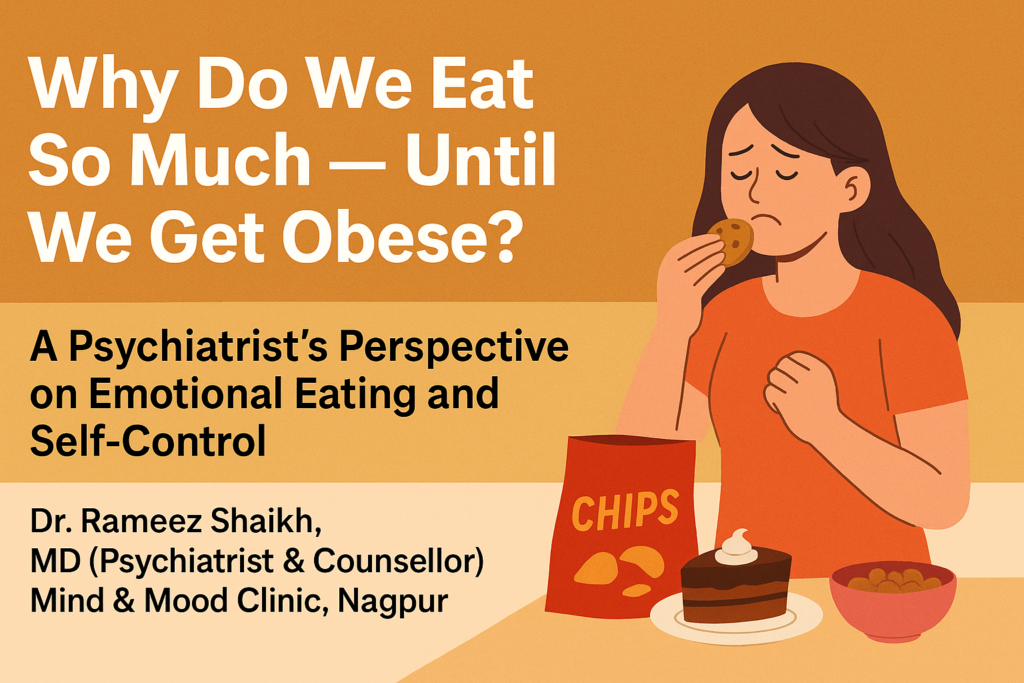🧠 The Real Question: “Why Do I Eat Even When I’m Not Hungry?”
You’re not alone if you’ve ever thought —
“I know I shouldn’t eat that packet of chips… but I can’t stop myself.”
Obesity is not just about food.
It’s about feelings, hormones, habits, and the brain’s reward system.
We often eat to fill an emotional void, not a physical one. The mind craves comfort, not calories.
⚙️ What Happens in the Brain When We Overeat?
When we eat something tasty — especially sugar, fat, or salt — the brain releases dopamine, the “pleasure chemical.”
This is the same chemical involved in addiction — drugs, alcohol, even social media.
So the brain starts linking food with comfort, relief, and happiness.
Over time, we eat not because we’re hungry, but because we want that dopamine “high” again.
Unfortunately, this cycle builds tolerance —
You need more food to get the same feeling.
That’s how emotional eating quietly turns into food addiction.
🍟 Psychological Causes of Overeating
- Stress Eating: Food becomes a coping mechanism for anxiety or pressure.
- Boredom Eating: Eating gives the brain something to do when idle.
- Loneliness: Food can temporarily replace human connection.
- Reward Habit: “I had a long day, I deserve a treat.”
- Childhood Conditioning: Parents offering food for every emotion (“don’t cry, have chocolate”).
💊 Is Obesity Linked with Psychiatry?
Yes — in multiple ways.
Studies show that nearly 40–60% of people with obesity have underlying psychological or emotional factors such as:
- Depression or Anxiety
- Binge Eating Disorder
- Body Image Disturbance
- Low Self-Esteem
- Impulse Control Issues
- Sleep Disorders
And it works both ways — obesity can cause depression, and depression can worsen obesity.
That’s why treatment should target both the mind and the body.
💬 Real Example from My Clinic (Name Changed)
Riya, 27, came to me saying she couldn’t stop eating late at night.
She would scroll through social media while snacking — chips, sweets, or ice cream — then feel guilty the next morning.
When we explored deeper, it wasn’t hunger. It was loneliness and stress.
With counselling, meal planning, and stress management, she lost 9 kg in 4 months — without strict dieting.
🧩 How to Control Food Cravings — Step by Step
1️⃣ Identify the Trigger
Before eating, ask:
“Am I physically hungry or emotionally uncomfortable?”
If it’s stress, anxiety, or boredom — pause before reacting.
2️⃣ Delay the Impulse
Wait for 10 minutes. Drink a glass of water or walk around.
Most cravings fade when we distract ourselves.
3️⃣ Mindful Eating
- Sit at the table — no TV or phone.
- Eat slowly and notice taste, texture, and aroma.
- Stop when you feel 70–80% full.
4️⃣ Regular Routine
Irregular sleep and meal timing disrupt hormones ghrelin (hunger) and leptin (satiety).
Try eating at fixed times daily.
5️⃣ Don’t Skip Breakfast
Skipping breakfast triggers bingeing later.
Start the day with protein and fiber — eggs, sprouts, fruits, or oats.
6️⃣ Handle Emotions Differently
When anxious — journal, call a friend, or go for a walk.
Food won’t fix emotions — it just hides them for a while.
🧘♀️ Exercise and Meditation — The Natural Antidote
Exercise is one of the best antidepressants and anti-craving tools.
It increases dopamine and serotonin naturally — without sugar or junk food.
✅ 30 minutes brisk walk, dance, or yoga daily.
✅ Avoid sitting for more than 45 minutes continuously.
Meditation helps regulate impulsivity and self-awareness.
Start with:
- Sit quietly for 5 minutes.
- Focus on breathing in for 4 seconds, out for 6 seconds.
- When the mind wanders, gently bring it back.
This retrains the brain to respond instead of react.
🌻 Small Lifestyle Tweaks That Work Wonders
- Eat in smaller plates — visual trick for portion control.
- Replace sugary drinks with lemon water or green tea.
- Keep junk food out of sight.
- Keep healthy snacks like nuts, fruits, or yogurt handy.
- Sleep 7–8 hours. Sleep deprivation increases hunger hormones.
❤️ Final Thoughts
“Weight loss is not punishment for overeating — it’s a gift of self-care.”
Don’t shame yourself for cravings or slip-ups.
They’re part of being human. What matters is consistency and awareness.
If you find yourself stuck in the cycle of overeating, guilt, and frustration — seek help.
Psychiatric counselling, CBT, and nutritional guidance together can break this cycle permanently.
You don’t have to struggle alone — help is available.
📍 Mind & Mood Clinic, Nagpur
👨⚕️ Dr. Rameez Shaikh, MD (Psychiatrist & Counsellor)
📞 +91-8208823738 🕒 Appointment Timing: 10 AM – 2 PM

Dr. Rameez Shaikh (MBBS, MD, MIPS) is a consultant Psychiatrist, Sexologist & Psychotherapist in Nagpur and works at Mind & Mood Clinic. He believes that science-based treatment, encompassing spiritual, physical, and mental health, will provide you with the long-lasting knowledge and tool to find happiness and wholeness again.
Dr. Rameez Shaikh, a dedicated psychiatrist , is a beacon of compassion and understanding in the realm of mental health. With a genuine passion for helping others, he combines his extensive knowledge and empathetic approach to create a supportive space for his patients.
